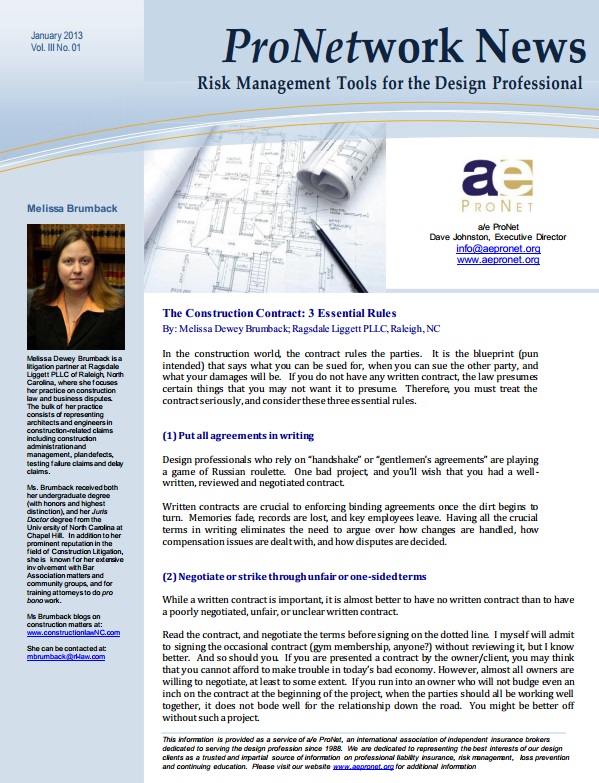 For design professionals, it’s good business to have a solid, fair contract in place before you begin work on a project. So, what are the three essential rules of putting together a construction contract? Our January 2013 ProNetwork News newsletter has the answer:
For design professionals, it’s good business to have a solid, fair contract in place before you begin work on a project. So, what are the three essential rules of putting together a construction contract? Our January 2013 ProNetwork News newsletter has the answer:
In the construction world, the contract rules the parties. It is the blueprint (pun intended) that says what you can be sued for, when you can sue the other party, and what your damages will be. If you do not have any written contract, the law presumes certain things that you may not want it to presume. Therefore, you must treat the contract seriously, and consider these three essential rules.
- Put all agreements in writing
- Negotiate or strike through unfair or one-sided terms
- Deal with discrepancies between the Proposal for Services and the Contract
(1) Put all agreements in writing
Design professionals who rely on “handshake” or “gentlemen’s agreements” are playing a game of Russian roulette. One bad project, and you’ll wish that you had a well-written, reviewed and negotiated contract.
Written contracts are crucial to enforcing binding agreements once the dirt begins to turn. Memories fade, records are lost, and key employees leave. Having all the crucial terms in writing eliminates the need to argue over how changes are handled, how compensation issues are dealt with, and how disputes are decided.
(2) Negotiate or strike through unfair or one-sided terms
While a written contract is important, it is almost better to have no written contract than to have a poorly negotiated, unfair, or unclear written contract.
Read the contract, and negotiate the terms before signing on the dotted line. I myself will admit to signing the occasional contract (gym membership, anyone?) without reviewing it, but I know better. And so should you. If you are presented a contract by the owner/client, you may think that you cannot afford to make trouble in today’s bad economy. However, almost all owners are willing to negotiate, at least to some extent. If you run into an owner who will not budge even an inch on the contract at the beginning of the project, when the parties should all be working well together, it does not bode well for the relationship down the road. You might be better off without such a project.
There is some built in level of protection if you use one of the standard form contracts discussed below. Even so, you need to look at the contract closely, particularly those changes and modifications to the default terms. Standard terms can cause problems if they will not work for your project and circumstances.
If your contract is not a standard contract, which is very often typical of and appropriate for smaller projects, you must examine the proposed contract even more closely. Contracts drafted by one party can often be extremely one-sided. You must carefully read the contract from top to bottom to make sure everything discussed is accounted for in the document.
Three of the biggest unfair provisions you may encounter are indemnity, duty to defend, and consequential damages.
Read the rest of this newsletter, The Construction Contract: 3 Essential Rules, as well as many other helpful issues of ProNetwork News by downloading the full PDF versions from our website.
About the Author:
Melissa Dewey Brumback is a litigation partner at Ragsdale Liggett PLLC of Raleigh, North Carolina, where she focuses her practice on construction law and business disputes. The bulk of her practice consists of representing architects and engineers in construction-related claims including construction administration and management, plan defects, testing failure claims and delay claims. Ms. Brumback received both her undergraduate degree (with honors and highest distinction), and her Juris Doctor degree from the University of North Carolina at Chapel Hill. In addition to her prominent reputation in the field of Construction Litigation, she is known for her extensive involvement with Bar Association matters and community groups, and for training attorneys to do pro bono work. Ms Brumback blogs on construction matters at: Construction Law in North Carolina. She can be contacted at: mbrumback@rl-law.com



